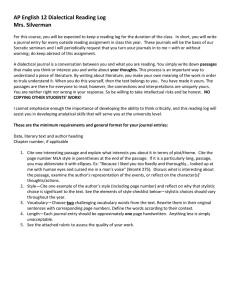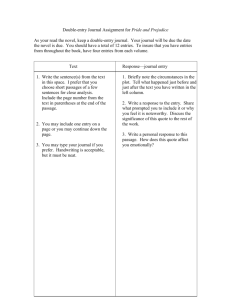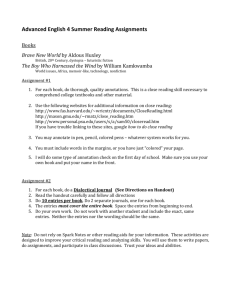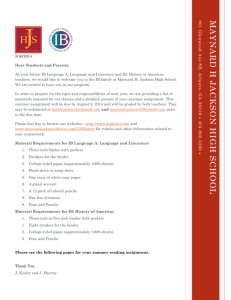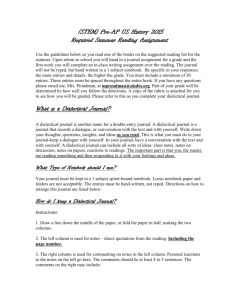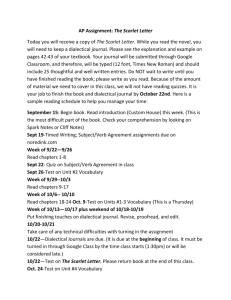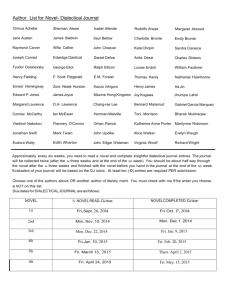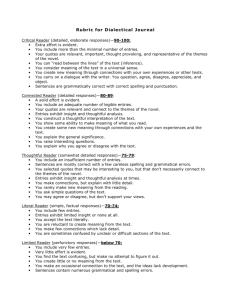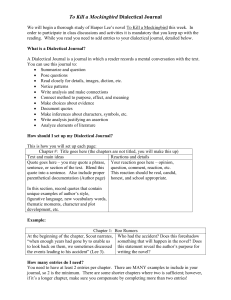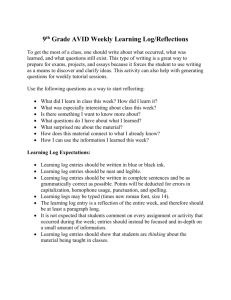AP English 12 Dialectical Reading Log Mrs. Silverman
advertisement
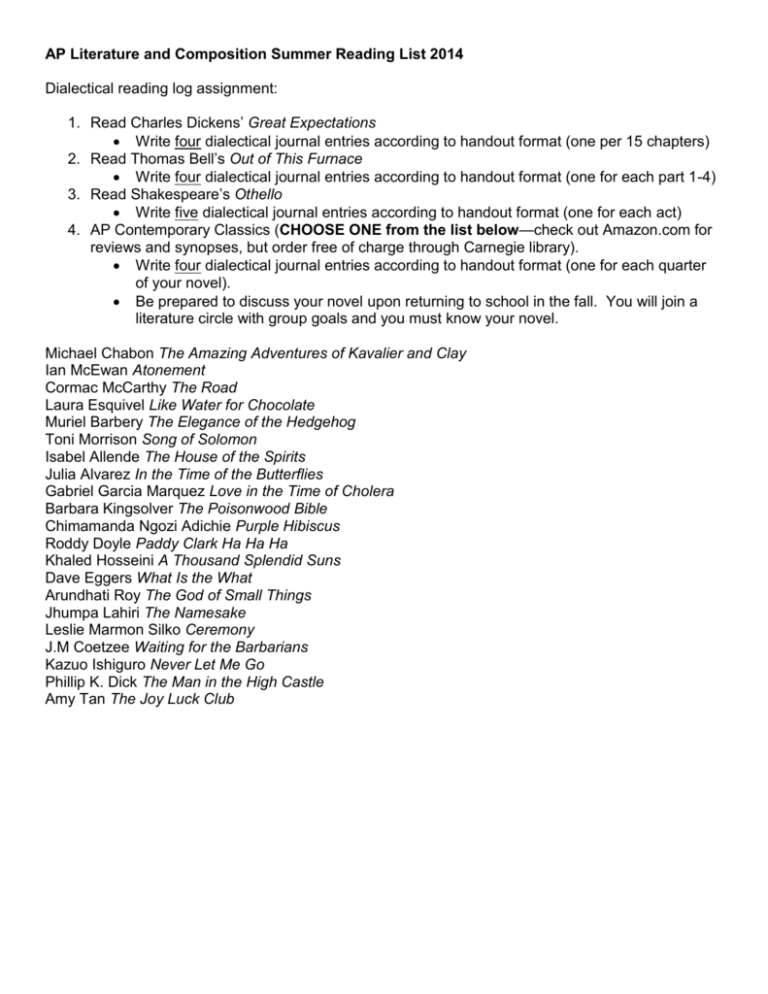
AP Literature and Composition Summer Reading List 2014 Dialectical reading log assignment: 1. Read Charles Dickens’ Great Expectations Write four dialectical journal entries according to handout format (one per 15 chapters) 2. Read Thomas Bell’s Out of This Furnace Write four dialectical journal entries according to handout format (one for each part 1-4) 3. Read Shakespeare’s Othello Write five dialectical journal entries according to handout format (one for each act) 4. AP Contemporary Classics (CHOOSE ONE from the list below—check out Amazon.com for reviews and synopses, but order free of charge through Carnegie library). Write four dialectical journal entries according to handout format (one for each quarter of your novel). Be prepared to discuss your novel upon returning to school in the fall. You will join a literature circle with group goals and you must know your novel. Michael Chabon The Amazing Adventures of Kavalier and Clay Ian McEwan Atonement Cormac McCarthy The Road Laura Esquivel Like Water for Chocolate Muriel Barbery The Elegance of the Hedgehog Toni Morrison Song of Solomon Isabel Allende The House of the Spirits Julia Alvarez In the Time of the Butterflies Gabriel Garcia Marquez Love in the Time of Cholera Barbara Kingsolver The Poisonwood Bible Chimamanda Ngozi Adichie Purple Hibiscus Roddy Doyle Paddy Clark Ha Ha Ha Khaled Hosseini A Thousand Splendid Suns Dave Eggers What Is the What Arundhati Roy The God of Small Things Jhumpa Lahiri The Namesake Leslie Marmon Silko Ceremony J.M Coetzee Waiting for the Barbarians Kazuo Ishiguro Never Let Me Go Phillip K. Dick The Man in the High Castle Amy Tan The Joy Luck Club AP English 12 Dialectical Reading Log Mrs. Silverman For this course, you will be expected to keep a reading log for the duration of the class. In short, you will write a journal entry for every outside reading assignment in class this year. These journals will be the basis of our Socratic seminars and I will periodically request that you turn your journals in to me—with or without warning; do keep abreast of this assignment. A dialectical journal is a conversation between you and what you are reading. You simply write down passages that make you think or interest you and write about your thoughts. This process is an important way to understand a piece of literature. By writing about literature, you make your own meaning of the work in order to truly understand it. When you do this yourself, then the text belongs to you. You have made it yours. The passages are there for everyone to read; however, the connections and interpretations are uniquely yours. You are neither right nor wrong in your response. So be willing to take intellectual risks and be honest. NO COPYING OTHER STUDENTS’ WORK! I cannot emphasize enough the importance of developing the ability to think critically, and this reading log will assist you in developing analytical skills that will serve you at the university level. These are the minimum requirements and general format for your journal entries: Date, literary text and author heading Chapter number, if applicable 1. Cite one interesting passage and explain what interests you about it in terms of plot/theme. Cite the page number MLA style in parentheses at the end of the passage. If it is a particularly long, passage, you may abbreviate it with ellipses. Ex: “Because I liked you too fixedly and thoroughly… looked up at me with human eyes and cursed me in a man’s voice” (Brontë 275). Discuss what is interesting about the passage, examine the author’s representation of the events, or reflect on the character(s)’ thoughts/actions. 2. Style—Cite one example of the author’s style (including page number) and reflect on why that stylistic choice is significant to the text. See the elements of style checklist below—stylistic choices should vary throughout the year. 3. Vocabulary—Choose two challenging vocabulary words from the text. Rewrite them in their original sentences with corresponding page numbers. Define the words according to their context. 4. Length—Each journal entry should be approximately one page handwritten. Anything less is simply unacceptable. 5. See the attached rubric to assess the quality of your work. Checklist: Elements of Literary Style 1. Sentence Structure Are the sentences long or short? Why do they change? Do they contain many subordinate clauses, or are they often fragments? Are there any digressions or interruptions? Is the word-order straightforward or unconventionally crafted? 2. Pace Is the writing heavily descriptive, with emphasis on setting and atmosphere, or does it focus on action and plot movement? 3. Expansive/Economical Is the writing tight and efficient, or elaborate and long-winded? Diction When does the author use one or the other mode, and why? 4. Vocabulary Are the words simple or fancy? Are they technical, flowery, colloquial, cerebral, punning, obscure (and so on...)? 5. Figures of speech Are there any metaphors, similes, or symbols? Are there any other uses of figurative language (personification, metonymy, and so on)? 6. Use of Dialogue How often does dialogue tell the story? Do we see whole conversations or just fragments? Does the conversation use slang or is it formal? Does it appear natural or contrived? Does the dialogue give a sense of pacing, of pauses, of the unsaid? How much does it substitute for narration? 7. Point of View Possibilities: first, second, third, omniscient, limited omniscient, multiple, inanimate, free indirect discourse. 8. Character development How does the author introduce characters, and how do we see their evolution in the story? What is their function and motivation? What kinds of characters are they? Full/round? Stock characters? Stereotypes? Caricatures? 9. Tone What is the author’s attitude? What is the mood of the story? Does the author seem sarcastic? Aggressive? Wistful? Pessimistic? In love? Philosophically detached? Hopeful? Ironic? Bitter? (And so on...) Whatever the tone, where is it visible in the narrative? 10. Word Color, Word How much does the language call attention to or depend on the quality of its Sound sound, e.g. through alliteration, assonance, consonance, dissonance, rhythm, unusual word choice, and so on? 11. Paragraph / Chapter Are paragraphs very short, or are they enormous blocks running across many Structure pages? Are the chapters short or long? How many are there, how are they organized, and why is this important? 12. Time Sequencing / How has the author organized the chronology of events? To what effect? What Chronology is the work’s structural “rhythm”? 13. Allusions How and how often does the author refer to other texts, myths, symbols, famous figures, historical events, quotations, and so on? 14. Experimentation in Are there any unusual techniques, such as stream-of-consciousness, mixing Language styles and genres, unusual layout on the page, breaking rules of grammar and form, odd or unstable narrative perspectives, onomatopoeia, and so on? 15. Metafictional Does the author call attention to his or her own process of narration? techniques Are the narrator’s position, role, and thoughts as a storyteller mentioned explicitly in the text? What function does this serve? Rubric for Dialectical Journal Critical Reader (detailed, elaborate responses)—90-100: Extra effort is evident. You include more than the minimal number of entries. Your quotes are relevant, important, thought provoking, and representative of the themes of the novel. You can “read between the lines” of the text (inference). You consider meaning of the text in a universal sense. You create new meaning through connections with your own experiences or other texts. You carry on a dialogue with the writer. You question, agree, disagree, appreciate, and object. Sentences are grammatically correct with correct spelling and punctuation. Connected Reader (detailed responses)—80-89: A solid effort is evident. You include an adequate number of legible entries. Your quotes are relevant and connect to the themes of the novel. Entries exhibit insight and thoughtful analysis. You construct a thoughtful interpretation of the text. You show some ability to make meaning of what you read. You create some new meaning through connections with your own experiences and the text. You explain the general significance. You raise interesting questions. You explain why you agree or disagree with the text. Thoughtful Reader (somewhat detailed responses)—75-79: You include an insufficient number of entries. Sentences are mostly correct with a few careless spelling and grammatical errors. You selected quotes that may be interesting to you, but that don’t necessarily connect to the themes of the novel. Entries exhibit insight and thoughtful analysis at times. You make connections, but explain with little detail. You rarely make new meaning from the reading. You ask simple questions of the text. You may agree or disagree, but don’t support your views. Literal Reader (simple, factual responses)—70-74: You include few entries. Entries exhibit limited insight or none at all. You accept the text literally. You are reluctant to create meaning from the text. You make few connections which lack detail. You are sometimes confused by unclear or difficult sections of the text. Limited Reader (perfunctory responses)—below 70: You include very few entries. Very little effort is evident. You find the text confusing, but make no attempt to figure it out. You create little or no meaning from the text. You make an occasional connection to the text, and the ideas lack development. Sentences contain numerous grammatical and spelling errors.
